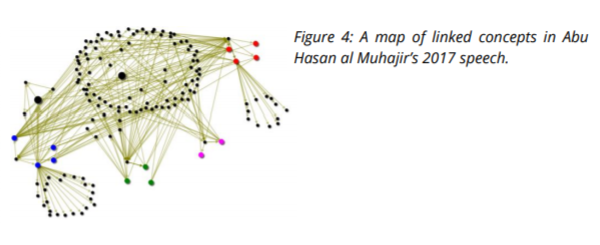JM Berger’s Extremism, from MIT Press. Brilliant.
[ by Charles Cameron — my third JM Berger review, following reviews of Jihad Joe and ISIS: State of Terror ]
.
**
I ordered a copy of JM Berger‘s Extremism months early from Amazon, having followed many of the posts in which he was formulating the insights that led to the book, and expecting a volume full of the very detailed diagrams and network analyses they contained:
Image sources:
ICCT, Countering Islamic State Messaging Through “Linkage-Based” Analysis Intelwire, EXTREMIST CONSTRUCTION OF IDENTITY
**
These diagrams, and the research that underlies them — the work of JM and his colleague, Haroro J Ingram — attest to JM’s skill at the detailed drill-down level, the equivalent of rock-face drilling in a mine. The book couldn’t be further from my expectations: it attests to an entirely different set of skills, those of simplicity, grace, and a superb command of language.
JM has the ability to communicate directly with a lay audience at their (our) level. He neither shies away from nuance nor adds needless complications — either of which would be a form of condescension to the reader.
JM’s writing is direct and clean:
Terrorism is a tactic, whereas extremism is a belief system. Extremism is a spectrum of beliefs, not necessarily a simple destination. Group radicalization precedes individual radicalization
**
Above are three of the pull-quotes, extracted from the book’s text, that state some of JM’s basic propositions on lucid, large-print, white on black pages, scattered as needed across the book’s 167 short pages (plus glossary, notes, bibliography, further reading, index)..
What extremism is, how extremist ideologies are constructed, and why extremism can escalate into violence
That’s the core proposition of the whole work, buttressed as it is with a wealth of detailed research and analysis. And radical…
JM’s approach is already radical in its (his) refusal to treat only one ideological or religious frame for extremism. Studying both ISIS and home grown Identity groups, those who promote violence and those who arguably foreshadow it, led JM to see extremism itself as the most fruitful category to study — not terrorism, nor Islam, not the Citizen Sovereignty movement nor alt-right, but extremism tout court.
That broadening of the frame allows Berger a set of analytic insights that were obscured by detail in earlier, more limited studies, and his book is the elegant formulation of those insights, simply, and with a forest of scholarship in support.
**
JM lists Impurity, Conspiracy, Dystopia, Existential threat, and Apocalypse as central “crisis narratives” utilized by in-groups as they view out-groups — but it is the in-group-out-group distinction which is central to his thinking, its wrongness characterized by the in-group’s paranoid conspiracist suspicions of the out-group’s impurity, dystopic being the nature of the world now ruled by the out-group, and to be abhorred or saved by the in-, with existential threat and apocalypse providing the sense of time-crunch, urgency.
All this, I say, with a simplicity and elegance which belies the originality and scholarship that undergirds it.
Above highly recommended.






